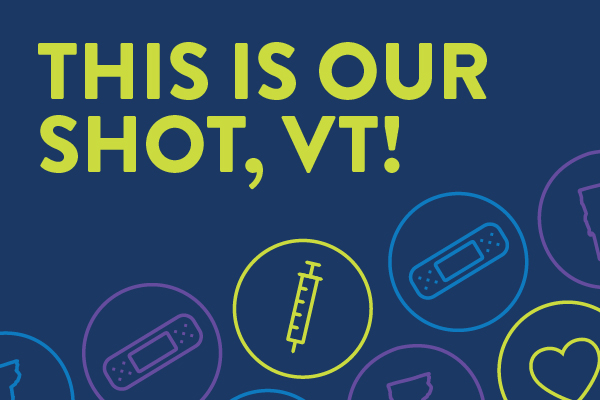COVID-19 Vaccines & Therapeutics
Please note: The information and resources below are geared toward community members. If you are a health care provider or facility seeking information or resources regarding the COVID-19 vaccine, please click here.
Vermont Information
Eligibility
It’s official—the public COVID-19 vaccine rollout is underway in Vermont. Wondering when you’ll be eligible to get vaccinated, and what to do when you are? Bookmark HealthVermont.gov/OurShotVT for the latest on vaccines and who’s eligible to get vaccinated.
All Vermont residents age 16 and older are now eligible to be vaccinated! Vaccine clinics are conveniently located around the state and vaccines are free for all Vermonters, even if you don’t have health insurance.
Getting the Vaccine
Registering online at HealthVermont.gov/MyVaccine is the quickest way to make an appointment. If that is not an option, you can also make an appointment by calling (855) 722-7878.
Only people who are currently eligible for vaccination will be able to make an appointment. If you have questions about the vaccine because of chronic conditions or medications, please discuss with your doctor or health care provider.
Why Get Vaccinated?
Along with social distancing, masks, and hand washing, vaccines are the most important ingredient in slowing the spread of the virus. The more people who get vaccinated, the faster the pandemic will end and we can get back to normal.
Aside from teaching your body how to fight off the virus that makes you sick, studies have shown that the two vaccines used in Vermont are safe and effective. Researchers studied more than 73,000 people between the Pfizer-BioNTech and Moderna vaccines and found no serious concerns. In fact, vaccine research on diseases similar to COVID-19, like SARS, has been in the works for decades.
Thanks for doing your part to keep our state safe and healthy!
Still Have Questions?
Please visit the Vermont Department of Health website for answers to more frequently asked questions about COVID-19 vaccines.
Vermont Resources
Vermont COVID-19 Vaccine Planning
Information and resources from the Vermont Department of Health related to Vermont's COVID-19 vaccine access and distribution plan.
VisitGeneral Information
COVID-19 Vaccine Information (Centers for Disease Control & Prevention)
Information and resources from the CDC with answers to commonly asked questions regarding COVID-19 vaccines, what to expect, how to register with V-safe and report any side effects, etc.
VisitCOVID Vaccination Tracker (Centers for Disease Control & Prevention)
The latest information from the CDC on total doses distributed and administered both nationwide and by state, vaccine type, etc.
VisitFact Sheet for Recipients & Caregivers of the Pfizer-BioNTech COVID-19 Vaccine
Information to help patients and their caregivers understand the risks and benefits of the Pfizer-BioNTech COVID-19 vaccine.
Download FDA Landing Page for Updates on Pfizer-BioNTech VaccinesFact Sheet for Recipients & Caregivers of the Moderna COVID-19 Vaccine
Information to help patients and their caregivers understand the risks and benefits of the Moderna COVID-19 vaccine.
DownloadVaccine Rollout Considerations
Who's Next In Your State's Vaccine Line? (The New York Times)
An interactive timeline comparing vaccination priorities by state, as well as how they compare to the CDC guidelines.
VisitThe Ethical Morass of Vaccine Eligibility (WNYC)
A discussion on WNYC's Brian Lehrer Show of who deserves to get vaccinated fist and whether taking the vaccine means that you're taking it away from someone who somehow deserves it more.
VisitBut Is it Fair? Bioethics, COVID-19 Vaccine Distribution, and Advocacy (Infectious Disease Advisor)
A conversation with Mildred Solomon, EdD, President of the Hastings Center and Professor of Global Health and Social Medicine at Harvard Medical School, on vaccine distribution, prioritization, and mandates.
VisitWhose Underlying Conditions Count for Priority in Getting the Vaccine? (Scientific American)
Many conditions increase the risk of COVID-19, but only 12 of them appear on the vaccine priority list created by the CDC and used by many states. The author argues that this list is no model for ethical vaccine distribution.
VisitCan’t Get a Shot? Thousands of ‘Vaccine Hunters’ Are Crossing State Borders to Get Theirs (The New York Times)
With variations in COVID-19 vaccine eligibility and access across states, "queue-jumping" continues to present ethical and justice challenges.
VisitThe (im)morality of line-jumping to get COVID-19 vaccines (The Philadelphia Inquirer)
In an interview with the Philadelphia Inquirer, Hastings Center research scholar Nancy Berlinger explains that queue-jumping violates foundational norms -- such as the idea that cutting in line is “shameful" -- and is a form of "deception," as it may involve lying.
VisitCovid-19 Vaccine Hesitancy Presents Challenge for Herd-Immunity Push (The Wall Street Journal)
An article arguing that responding to vaccine hesitancy among minority populations is of crucial importance in effective vaccination strategies.
VisitIs It Ever OK To Jump Ahead In The Vaccine Line? (NPR)
A conversation with three bioethicists about whether it is ever fair to cut in line to receive the COVID-19 vaccine if you think the system isn't working.
Visit